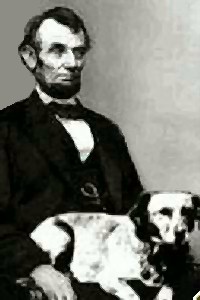Call: (989) 445-0103
Abraham Lincoln had the first Presidential dog ever photographed — a dog named “Fido” — and he is surely the first President to have ever written a poem about a hunting terrier.
Before there were pedigree terriers in America there were cross-bred feists (sometimes spelled “fice” or “fyce”) — small, scrappy dogs with a terrier genetic base. These dogs were used for everything from ratting to fox hunting, and even bear hunting.
The first know written use of the term feist (written “foist”) is found in George Washington’s diary in 1770 (“A small foist looking yellow cur.”).
Feists were used for squirrel, possum, raccoon, deer and fox hunting, and found particular favor among bear hunters for their fearlessness and ability to worry a bear enough that they would bolt out of thickets.
Teddy Roosevelt’s favorite dog — Skip — was a small feist he obtained from John Goff during a 1905 bear hunt, but Abraham Lincoln was the first President to write a poem mentioning the small purely-American hunting dog.
In the poem below, written in 1844 for his friend Andrew Johnston, Lincoln mocks the bragging hunter while giving a nod to the bravery of the hounds and the need to curb “bears [that] preyed on the swine”.
Later on William Faulkner would feature a feist as a prominent component of his short novel, “The Bear”:
The Bear Hunt by Abraham Lincoln
A wild-bear chace, didst never see?
Then hast thou lived in vain.
Thy richest bump of glorious glee,
Lies desert in thy brain.
When first my father settled here,
‘Twas then the frontier line:
The panther’s scream, filled night with fear
And bears preyed on the swine.
But wo for Bruin’s short lived fun,
When rose the squealing cry;
Now man and horse, with dog and gun,
For vengeance, at him fly.
A sound of danger strikes his ear;
He gives the breeze a snuff;
Away he bounds, with little fear,
And seeks the tangled rough.
On press his foes, and reach the ground,
Where’s left his half munched meal;
The dogs, in circles, scent around,
And find his fresh made trail.
With instant cry, away they dash,
And men as fast pursue;
O’er logs they leap, through water splash,
And shout the brisk halloo.
Now to elude the eager pack,
Bear shuns the open ground;
Th[r]ough matted vines, he shapes his track
And runs it, round and round.
The tall fleet cur, with deep-mouthed voice,
Now speeds him, as the wind;
While half-grown pup, and short-legged fice,
Are yelping far behind.
And fresh recruits are dropping in
To join the merry corps:
With yelp and yell,–a mingled din–
The woods are in a roar.
And round, and round the chace now goes,
The world’s alive with fun;
Nick Carter’s horse, his rider throws,
And more, Hill drops his gun.
Now sorely pressed, bear glances back,
And lolls his tired tongue;
When as, to force him from his track,
An ambush on him sprung.
Across the glade he sweeps for flight,
And fully is in view.
The dogs, new-fired, by the sight,
Their cry, and speed, renew.
The foremost ones, now reach his rear,
He turns, they dash away;
And circling now, the wrathful bear,
They have him full at bay.
At top of speed, the horse-men come,
All screaming in a row,
“Whoop! Take him Tiger. Seize him Drum.”
Bang,–bang–the rifles go.
And furious now, the dogs he tears,
And crushes in his ire,
Wheels right and left, and upward rears,
With eyes of burning fire.
But leaden death is at his heart,
Vain all the strength he plies.
And, spouting blood from every part,
He reels, and sinks, and dies.
And now a dinsome clamor rose,
‘Bout who should have his skin;
Who first draws blood, each hunter knows,
This prize must always win.
But who did this, and how to trace
What’s true from what’s a lie,
Like lawyers, in a murder case
They stoutly argufy.
Aforesaid fice, of blustering mood,
Behind, and quite forgot,
Just now emerging from the wood,
Arrives upon the spot.
With grinning teeth, and up-turned hair–
Brim full of spunk and wrath,
He growls, and seizes on dead bear,
And shakes for life and death.
And swells as if his skin would tear,
And growls and shakes again;
And swears, as plain as dog can swear,
That he has won the skin.
Conceited whelp! we laugh at thee–
Nor mind, that now a few
Of pompous, two-legged dogs there be,
Conceited quite as you.
——————————————————————-
In “The Bear,” William Faulkner’s paen to the demise of the Great American Wilderness, he writes of a small fyst (sometimes spelled feist) who, along with the larger dog Lion, is a chief protagonist of the story:
“… the little mongrel dog showed him that, by possessing one thing other, he would possess them both; and a little dog, nameless and mongrel and many-fathered, grown yet weighing less than six pounds, who couldn’t be dangerous because there was nothing anywhere much smaller, not fierce because that would have been called just noise, not humble because it was already too near the ground to genuflect, and not proud because it would not have been close enough for anyone to discern what was casting that shadow, and which didn’t even know it was not going to heaven since they had already decided it had no immortal soul, so that all it could be was brave even though they would probably call that too just noise.”
Today “The Bear” is generally printed as a central component of the Faulkner novel, “Go Down Moses.”


You must be logged in to post a comment.